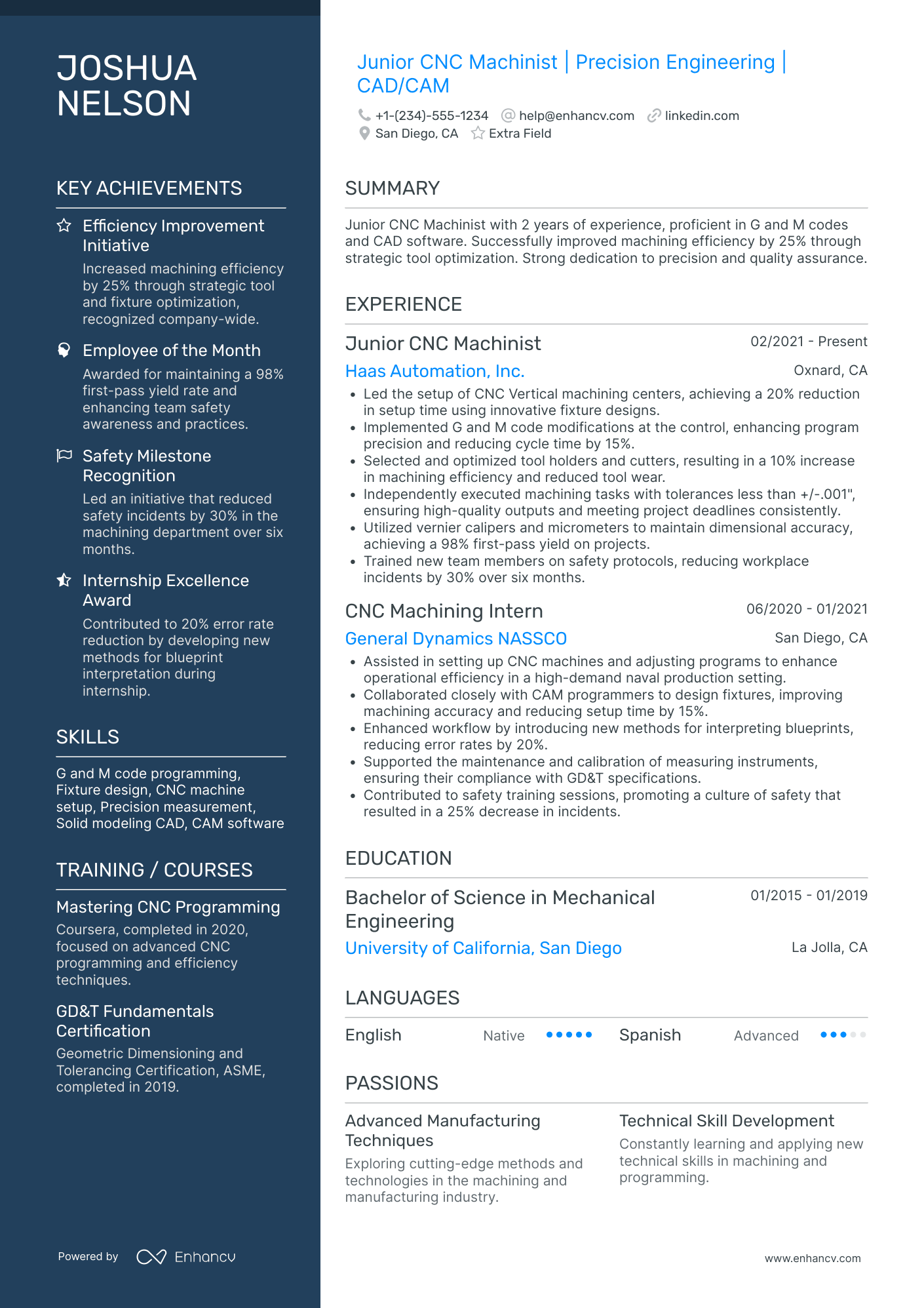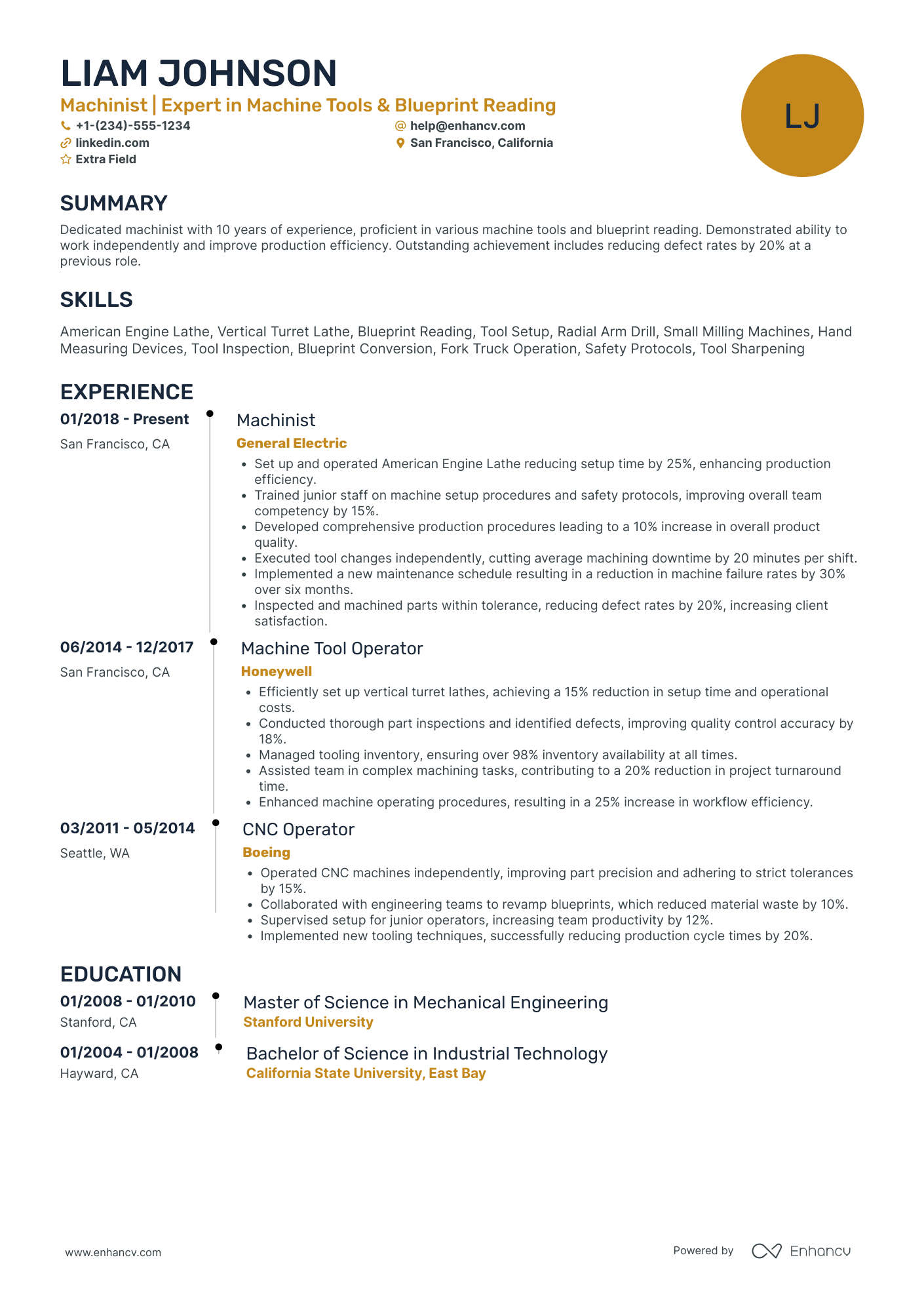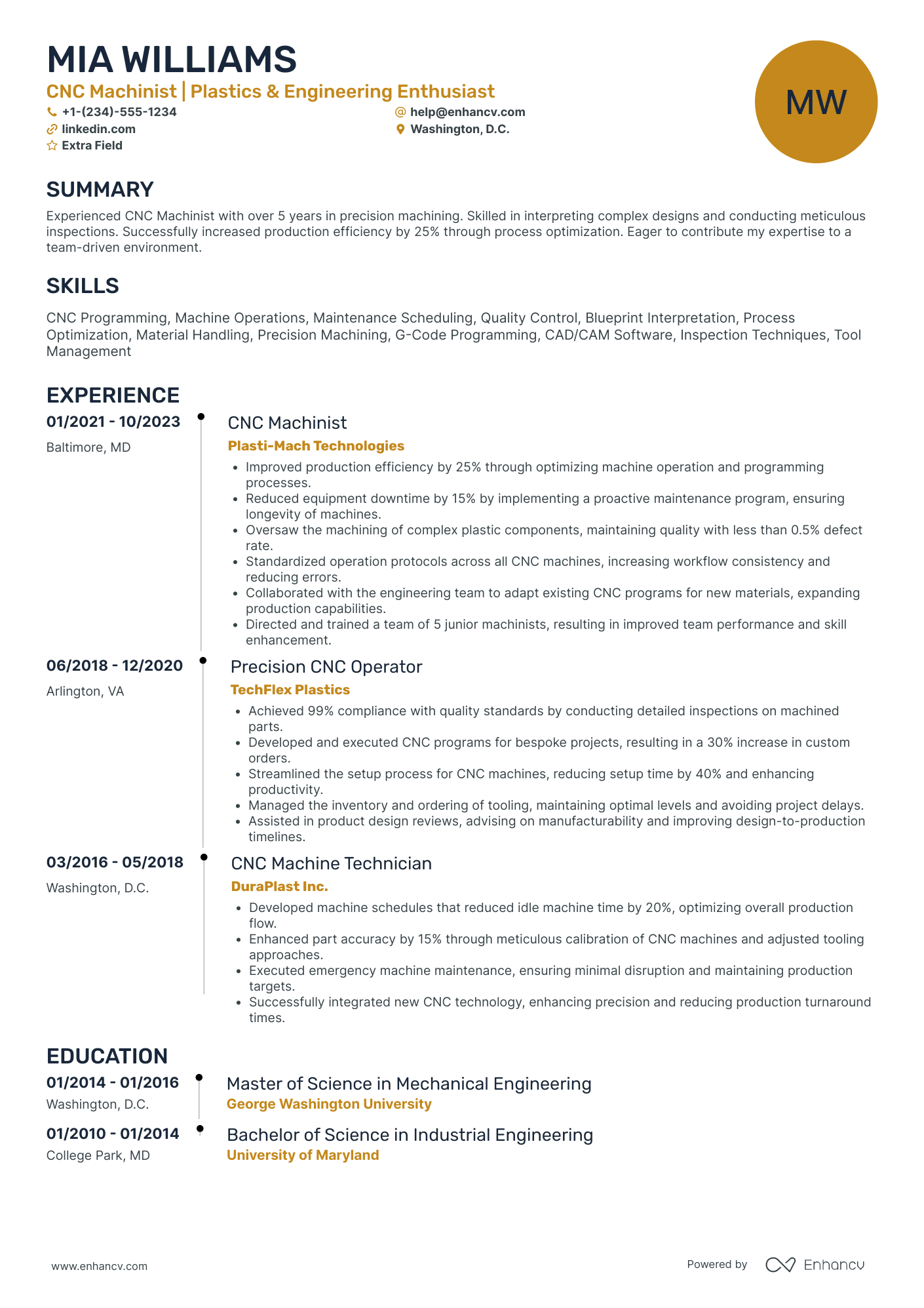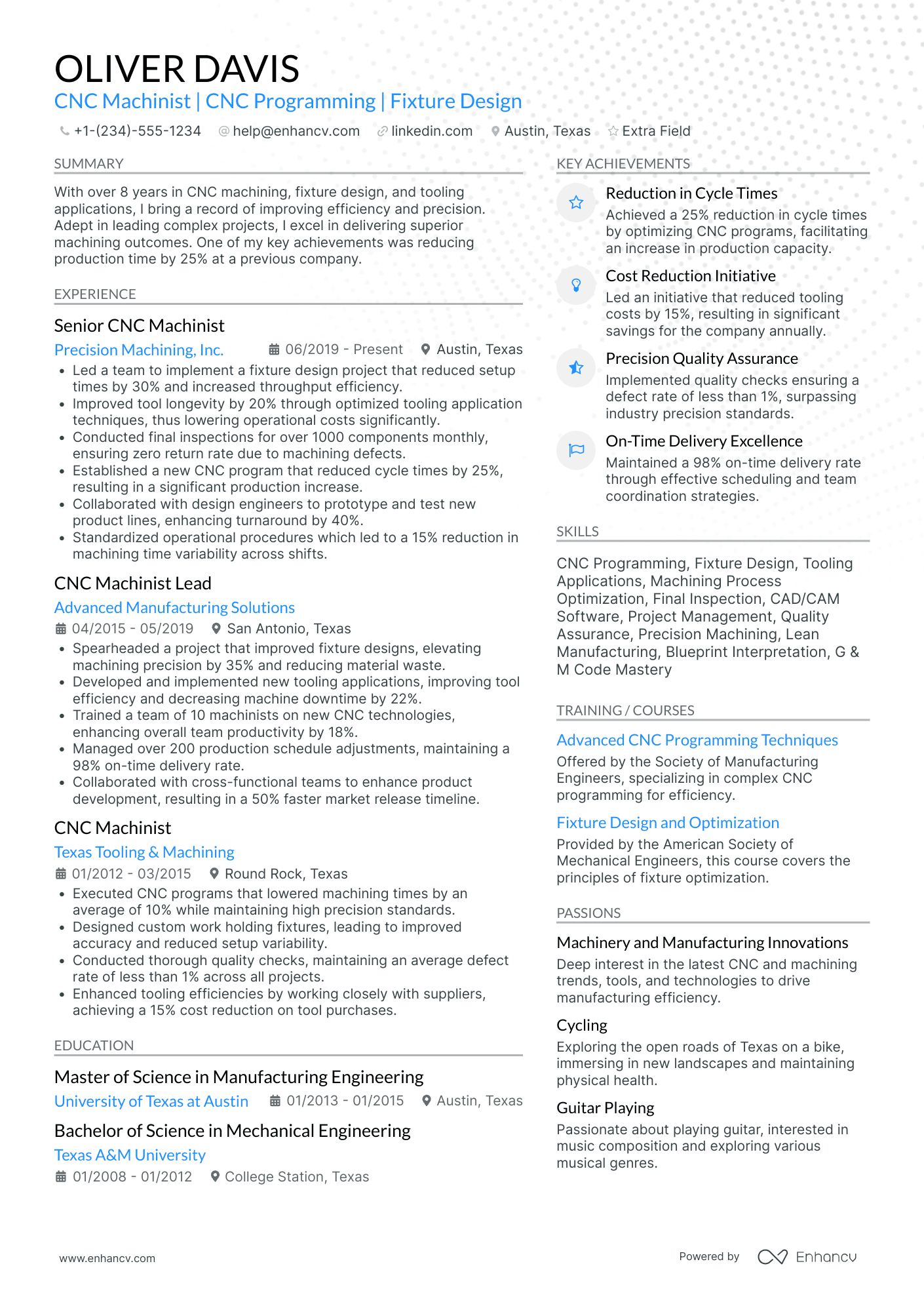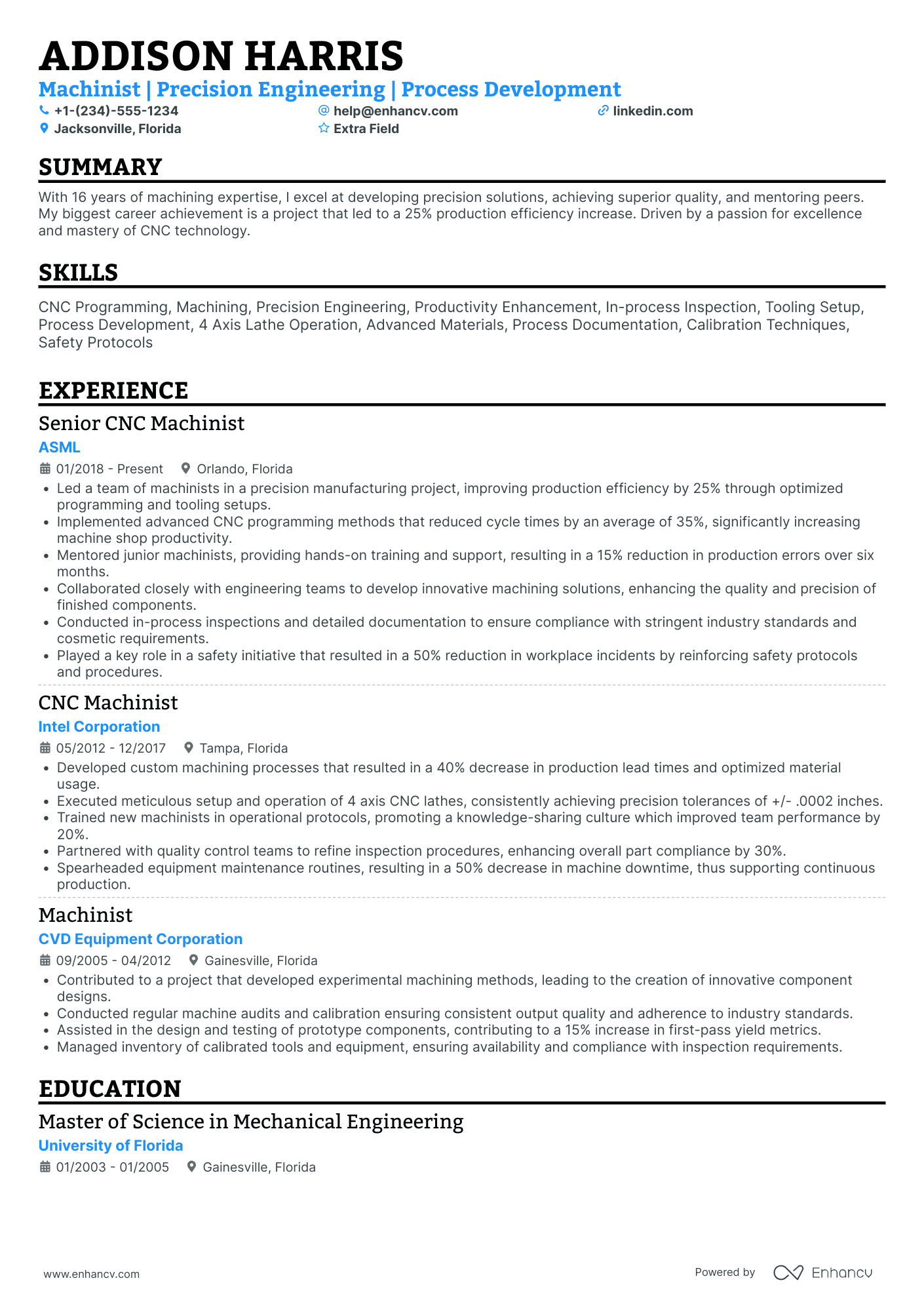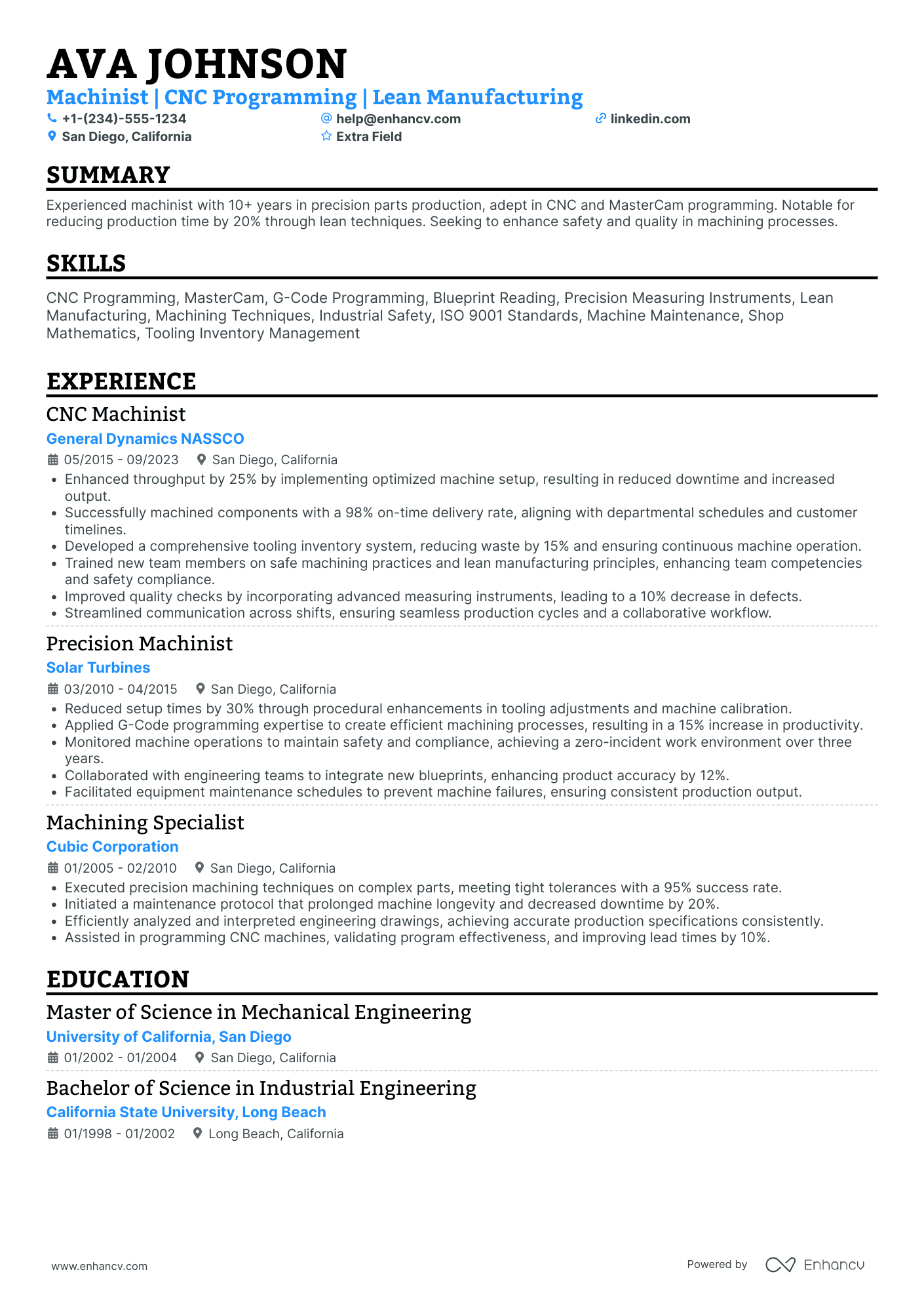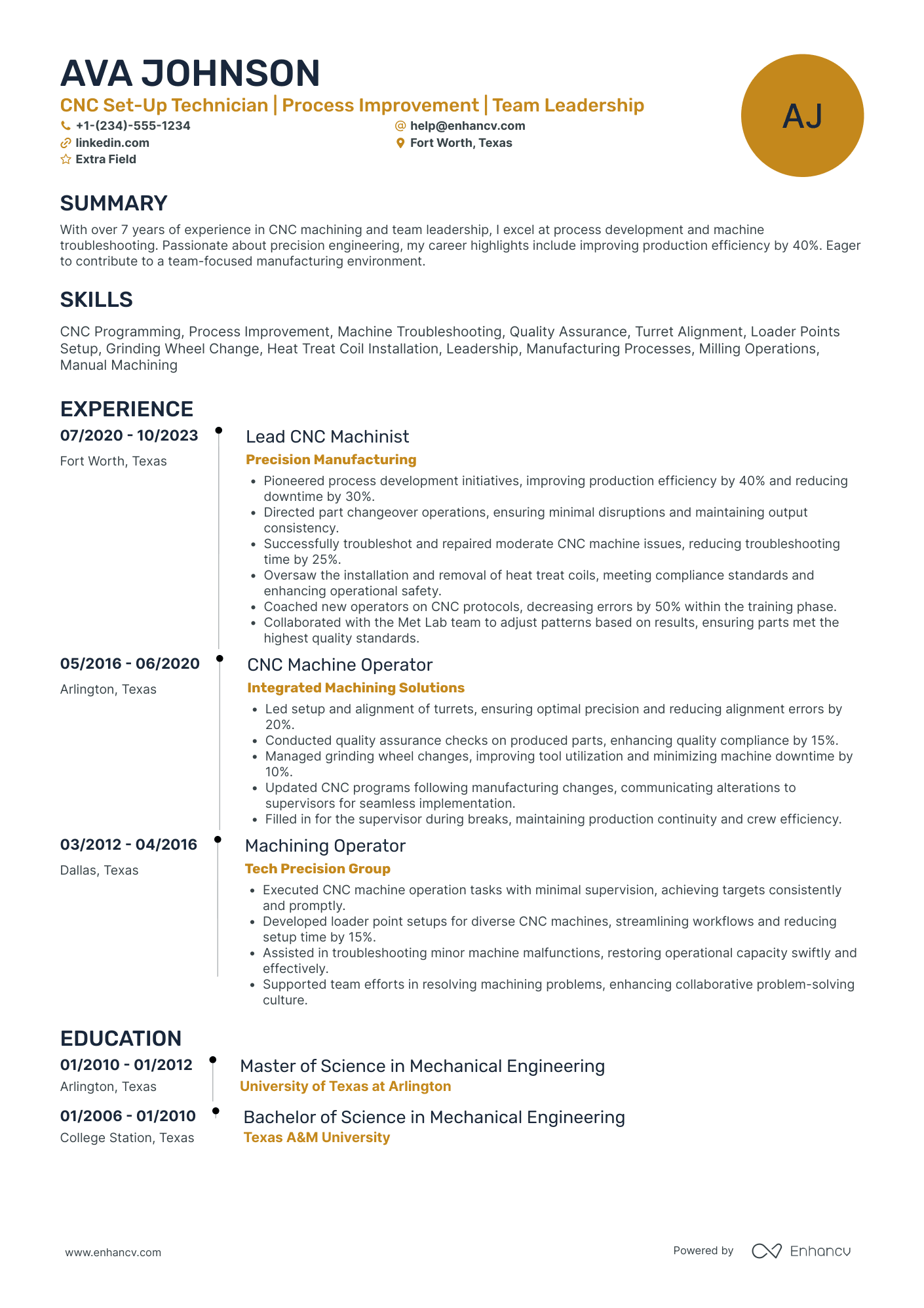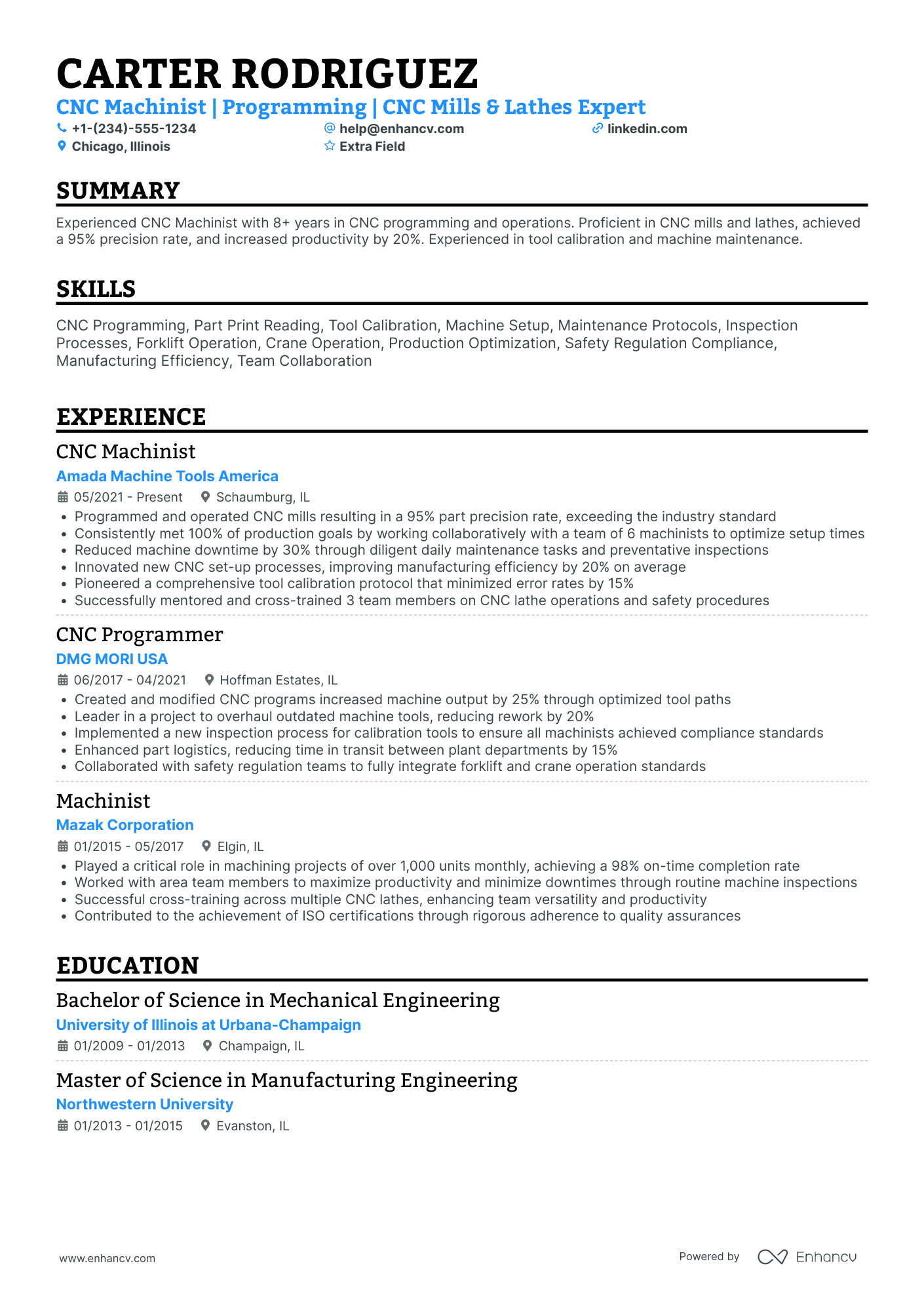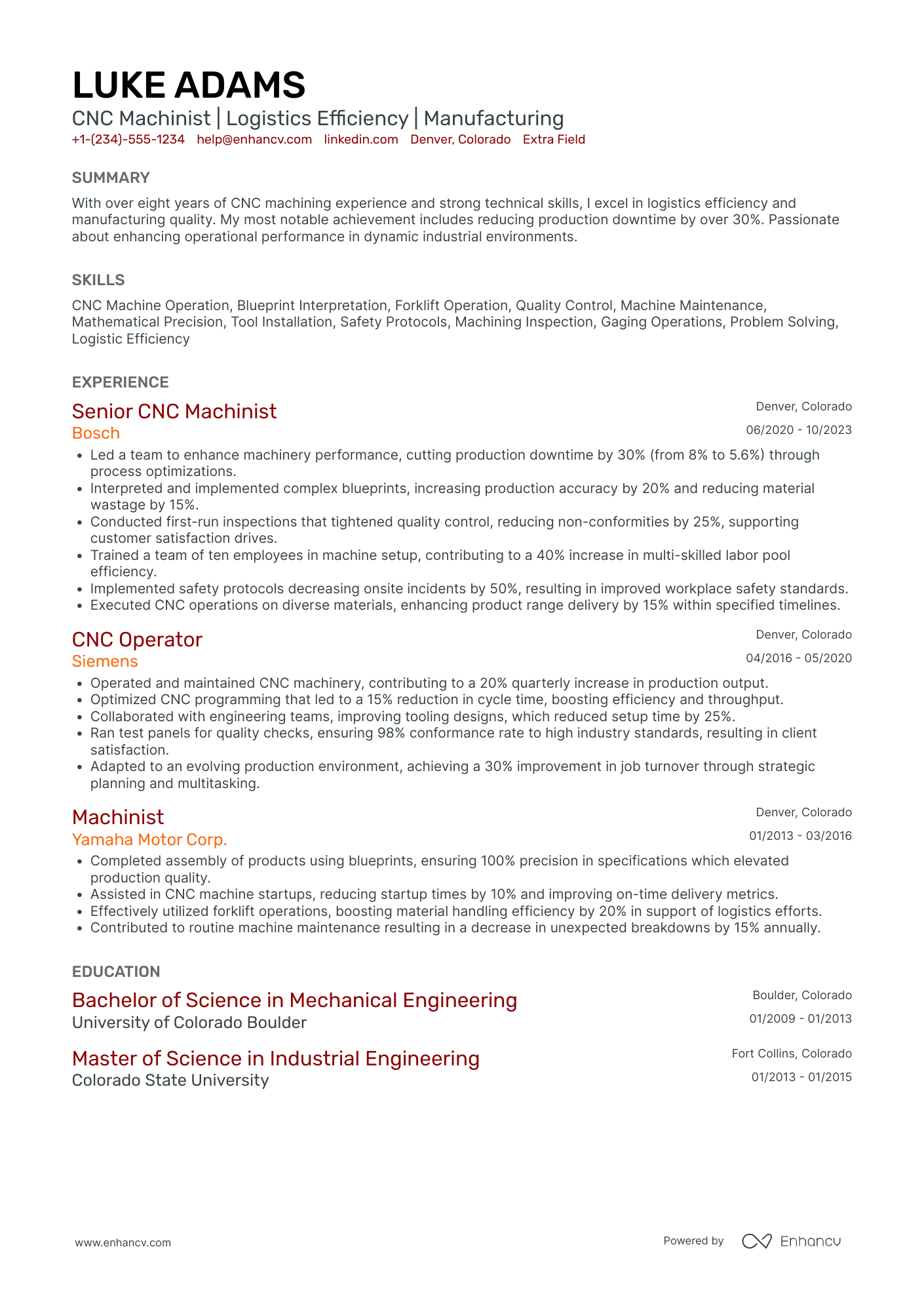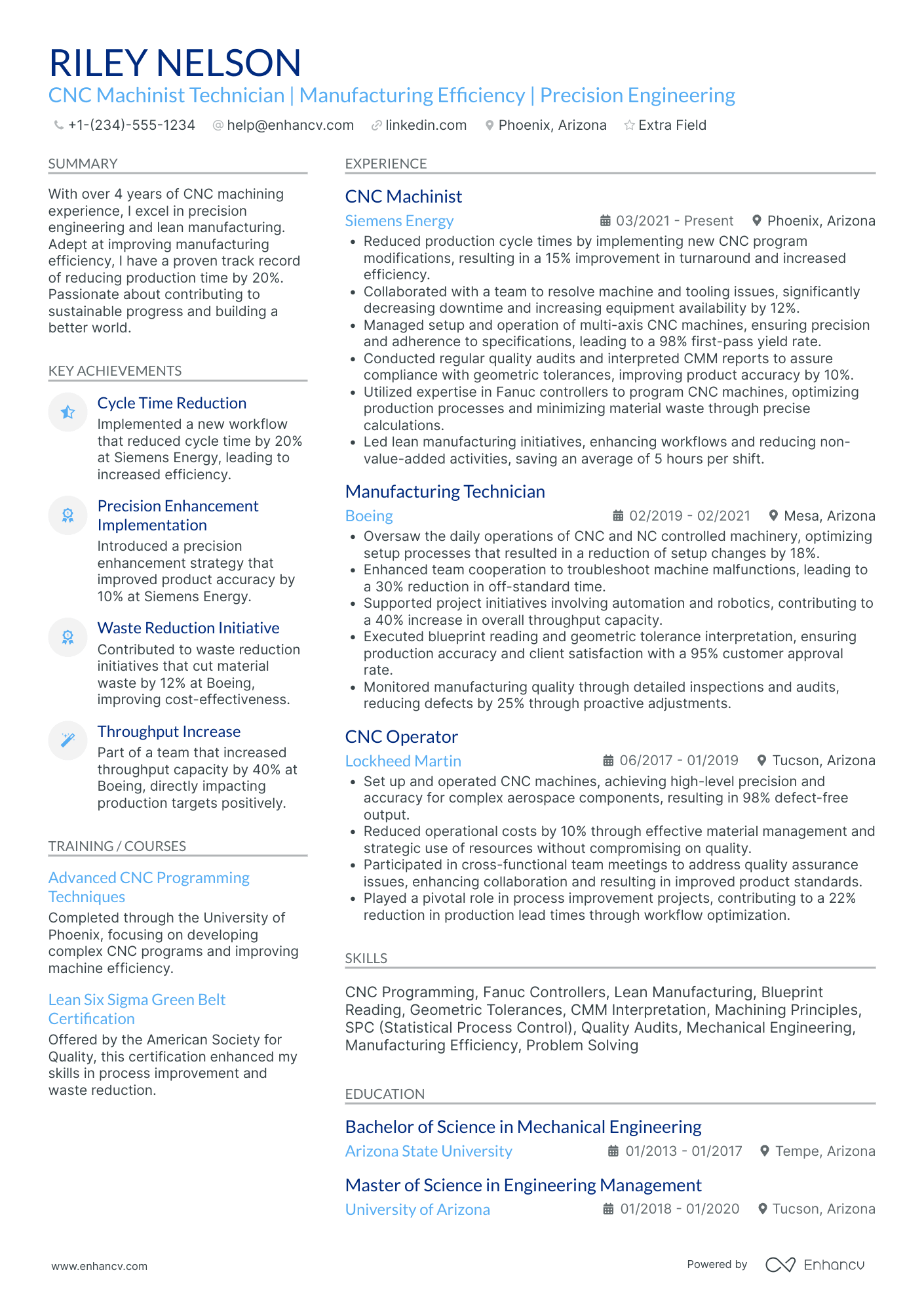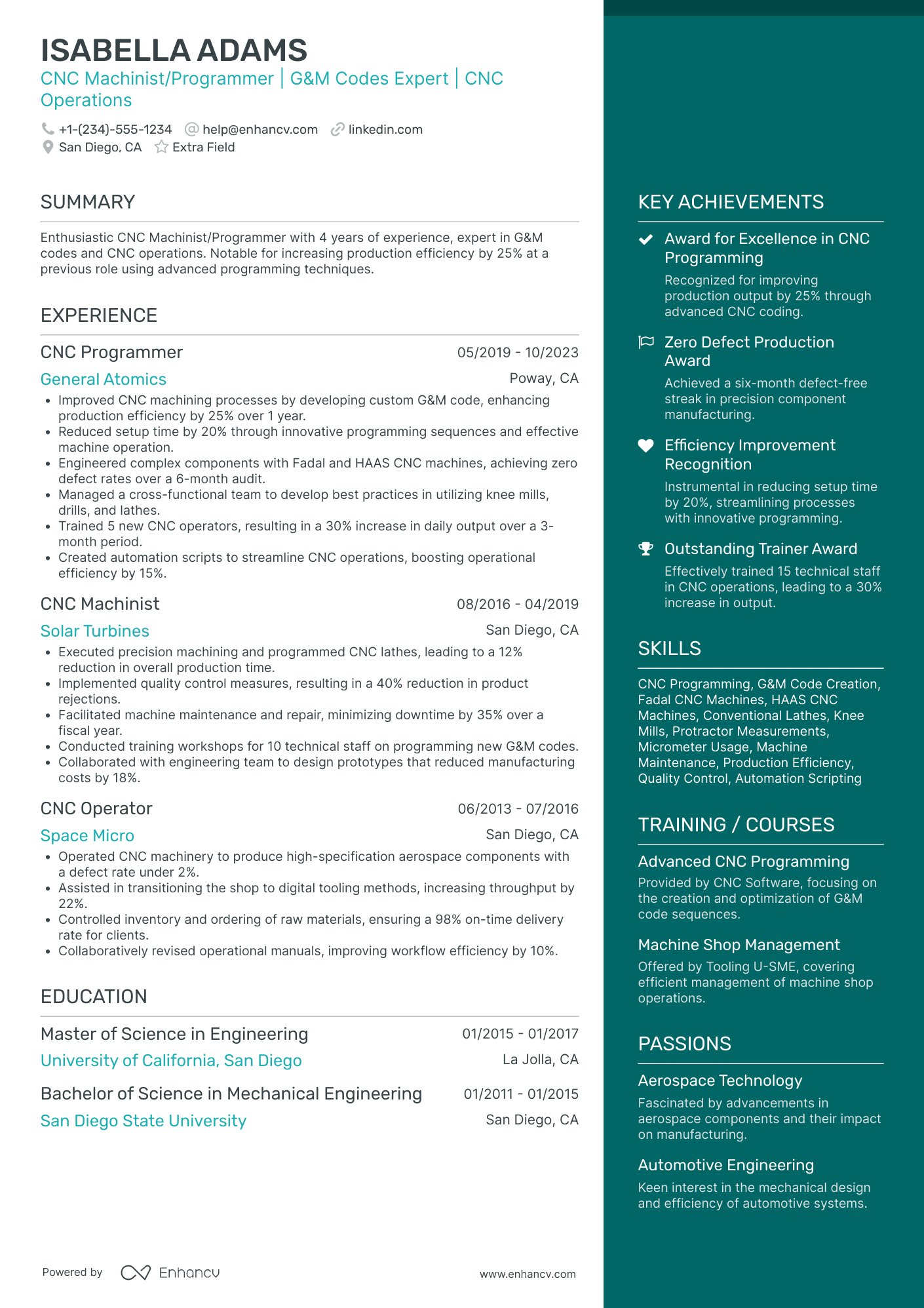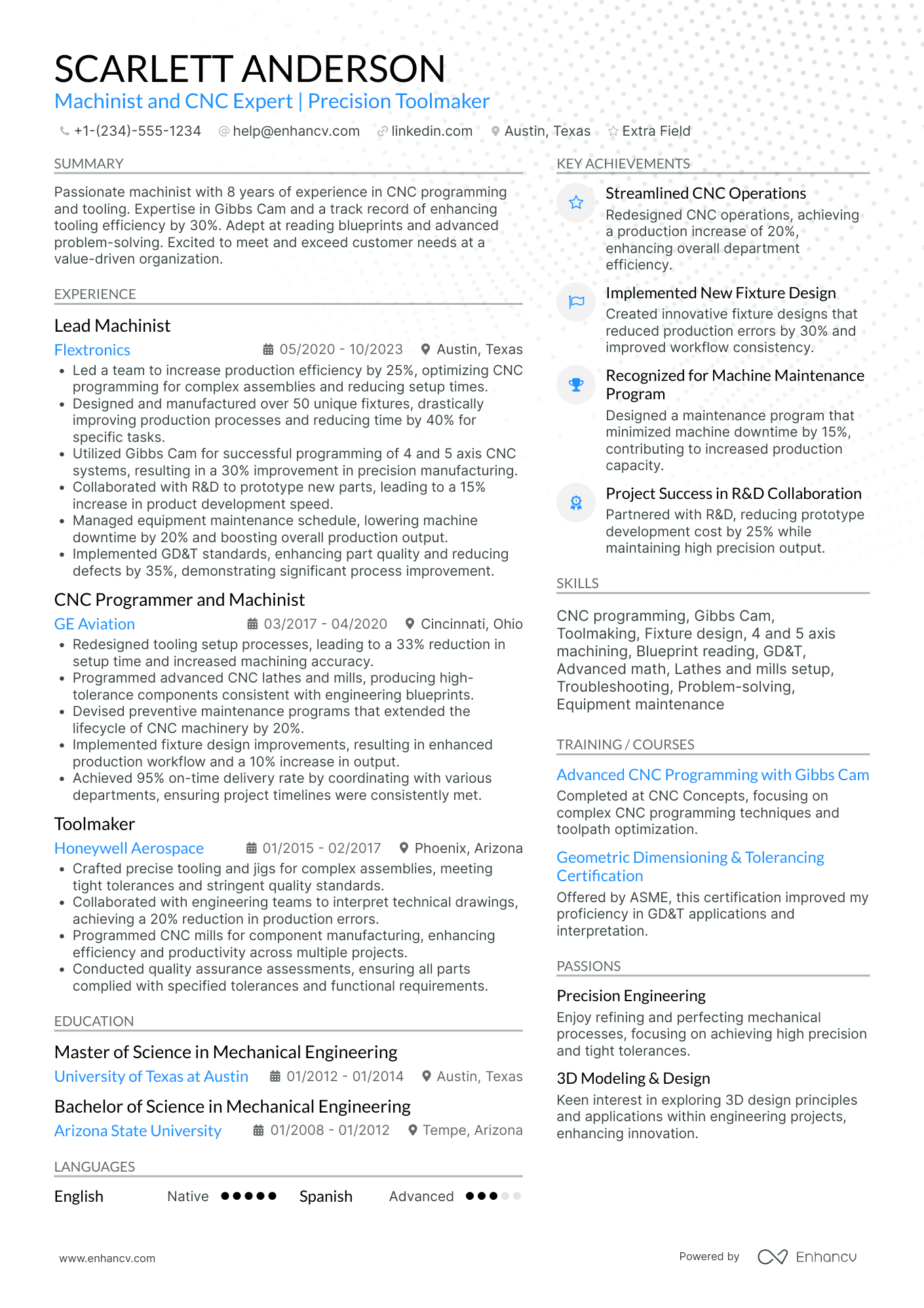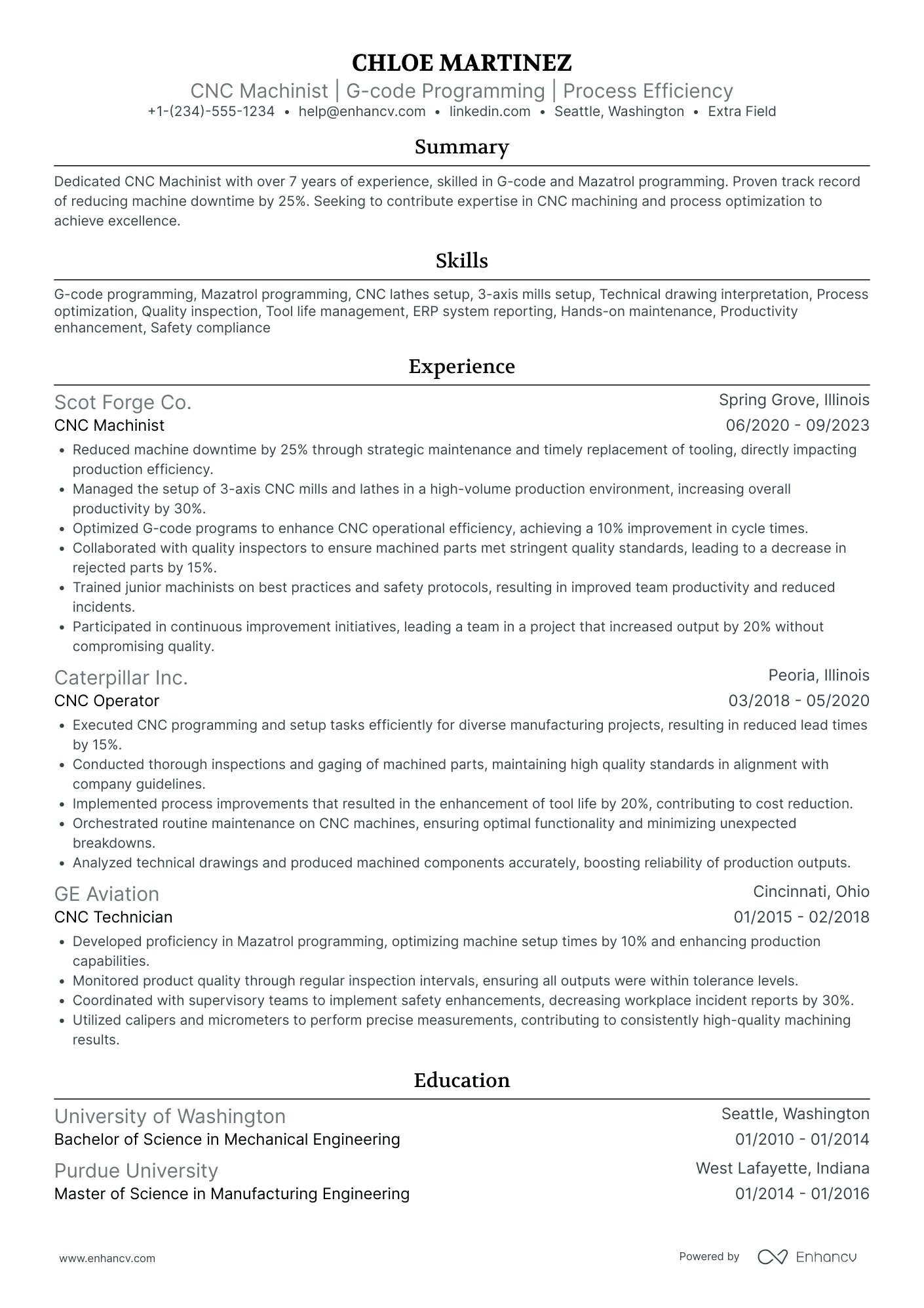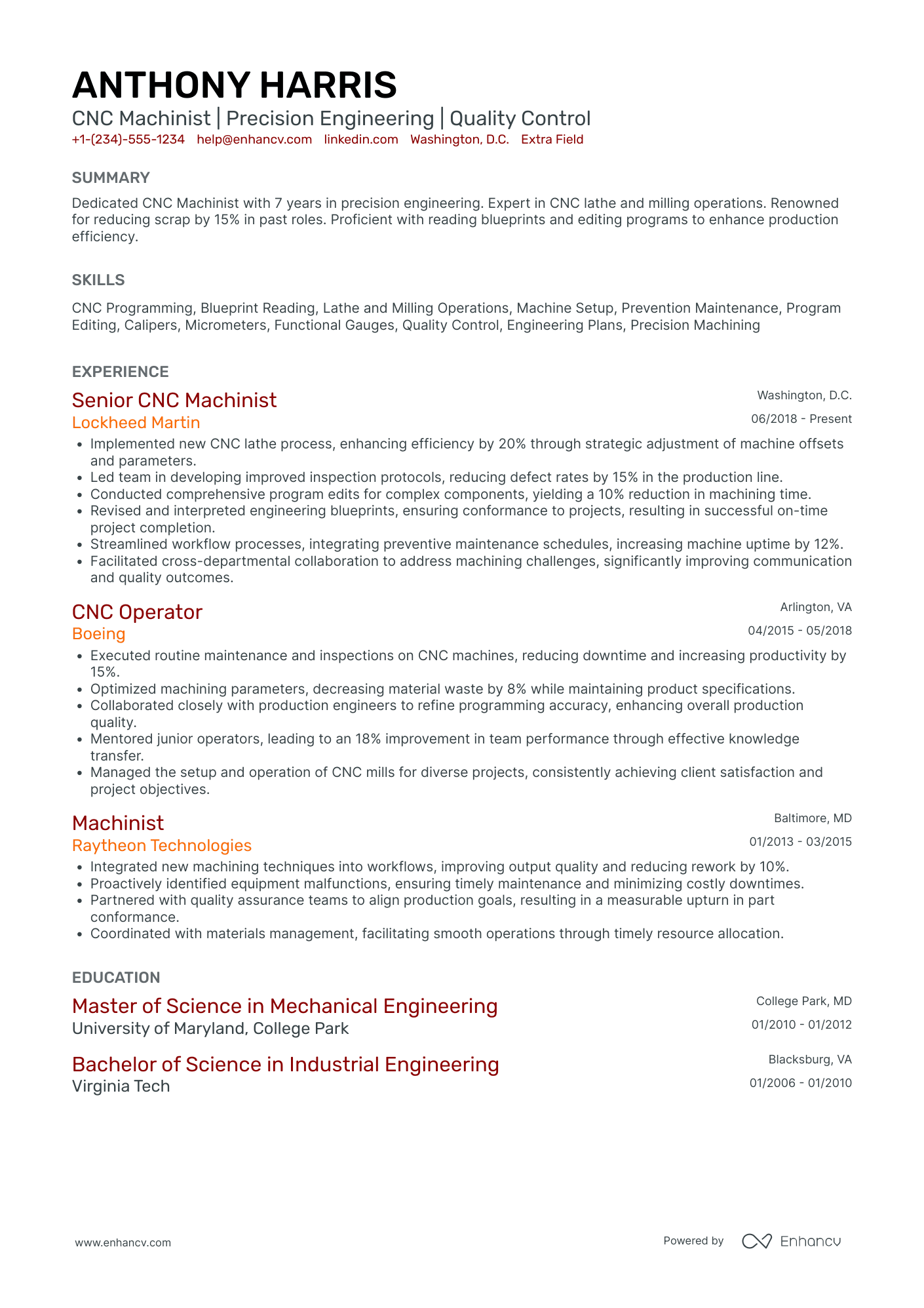As a CNC machinist, articulating the breadth of your technical skills and machine proficiency on a resume can be a daunting challenge. Our comprehensive guide is tailored to help you effectively showcase your expertise, ensuring your resume stands out to potential employers.
- Find different CNC machinist resume examples to serve as inspiration to your professional presentation.
- How to use the summary or objective to highlight your career achievements.
- How to create the experience section to tell your story.
- Must have certificates and what to include in the education section of your resume.
If the CNC machinist resume isn't the right one for you, take a look at other related guides we have:
The ultimate formula for your CNC machinist resume format
Our best advice on how to style your CNC machinist resume is this - first, take the time to study the job advert requirements.
The resume format you select should ultimately help you better align how your experience matches the specific role.
There are four crucial elements you need to thus take into consideration:
- How you present your experience. If you happen to have plenty of relevant expertise, select the reverse-chronological resume format to organize your experience by dates, starting with the latest.
- Don't go over the top with writing your resume. Instead, stick with a maximum of two-page format to feature what matters most about your profile.
- Headers aren't just for "decoration". The header of your resume helps recruiters allocate your contact details, portfolio, and so much more.
- The PDF format rules. It's the most common practice to submit your CNC machinist resume as a PDF so that your resume doesn't lose its layout. However, make sure the read the job well - in some instances, they might require a doc file.
Tailor your resume format to the job market – a Canadian resume, for example, might differ in layout.
Upload & Check Your Resume
Drop your resume here or choose a file. PDF & DOCX only. Max 2MB file size.
PRO TIP
Highlight any significant extracurricular activities that demonstrate valuable skills or leadership.
Traditional sections, appreciated by recruiters, for your CNC machinist resume:
- Clear and concise header with relevant links and contact details
- Summary or objective with precise snapshot of our career highlights and why you're a suitable candidate for the CNC machinist role
- Experience that goes into the nuts and bolts of your professional qualifications and success
- Skills section(-s) for more in-depth talent-alignment between job keywords and your own profile
- Education and certifications sections to further show your commitment for growth in the specific niche
What recruiters want to see on your resume:
- Proficiency in reading and interpreting technical drawings and blueprints
- Experience with CNC programming and operation of various CNC machines
- Knowledge of machining processes, tools, and materials
- Ability to set up, calibrate, and maintain CNC machinery and tooling
- Experience with precision measurement and quality control inspection tools
Adding your relevant experience to your CNC machinist resume
If you're looking for a way to show recruiters that your expertise is credible, look no further than the resume experience section.
Your CNC machinist resume experience can be best curated in a structured, bulleted list detailing the particulars of your career:
- Always integrate metrics of success - what did you actually achieve in the role?
- Scan the CNC machinist advert for your dream role in search of keywords in the job requirements - feature those all through your past/current experience;
- Dedicate a bullet (or two) to spotlight your technical capabilities and how you're able to use the particular software/technology in your day-to-day roles;
- Write simple by including your responsibility, a job advert keyword or skill, and a tangible outcome of your success;
- Use the experience section to also define the unique value of working with you in the form of soft skills, relevant feedback, and the company culture you best thrive in.
Industry leaders always ensure that their resume experience section offers an enticing glimpse at their expertise, while telling a career narrative. Explore these sample CNC machinist resumes on how to best create your resume experience section.
- Mastered the operation of 3-axis and 5-axis CNC machines, producing complex aerospace components with a 99.8% precision rate, reducing waste by 15%
- Pioneered a custom fixture design for holding non-standard workpieces, increasing machine run time by 25% and boosting overall productivity
- Collaborated with engineers to refine machining processes, which enhanced the longevity of cutting tools by 40% and cut down on maintenance costs
- Programmed CNC lathes and mills using Mastercam for intricate medical device parts, achieving a dimensional accuracy within +/- 0.0005 inches
- Supervised a team of 8 machinists, leading to a 20% improvement in team efficiency through skill development and optimized workflow
- Implemented a continuous improvement program that resulted in a 30% reduction in machining time for a high-volume product line
- Operated multi-axis CNC milling centers to produce automotive parts with stringent quality requirements, maintaining less than a 1% scrap rate
- Assessed and calibrated machinery according to ISO 9001 standards, ensuring compliance and maintaining a defect-free production streak for 6 months
- Managed material inventory which led to a reduction of material waste by 10% through the introduction of a just-in-time inventory system
- Developed optimized tool paths for CNC machining of complex components in aerospace, resulting in a 15% increase in material removal rates
- Led cross-functional teams in 5S workplace organization methods to enhance operational efficiency, preventing downtime and improving machine availability by 20%
- Managed a critical project to integrate automated part loading systems, which increased output by 17% while reducing labor costs
- Contributed to the production of high-precision custom molds for the plastics industry, with zero returns or rework required over a period of 2 years
- Reduced setup times by 50% through the implementation of Lean manufacturing techniques and tool pre-setting procedures
- Authored comprehensive work instructions that led to a 95% first-time pass rate of machined components during quality control checks
- Specialized in 3D machining of complex surfaces for high-performance automotive prototypes, achieving surface finishes finer than Ra 0.8 micrometers
- Deployed rigorous quality control measures, resulting in a consistent 99% quality rate and a 30% reduction of rework
- Cultivated expertise in the use of exotic materials, navigating the unique challenges of working with Inconel and titanium to meet bespoke project requirements
- Streamlined the tooling changeover process on CNC machines for a high output production line, slicing the average changeover time by 35%
- Engaged in continuous training to keep abreast of cutting-edge machining technologies, leading to a 25% productivity improvement for new product lines
- Contributed to a 20% cost saving initiative by proposing alterations in machining strategies that reduced tool wear and increased tool life
- Efficiently operated and maintained CNC machines for the production of intricate components used in the oil and energy sector with a 99.5% accuracy rate
- Played a key role in the adoption of a new coolant system that extended tool life by 50%, leading to significant cost savings in tooling expenses
- Drove a company-wide initiative to recycle scrap metal, which recuperated over $200,000 annually back into the production budget
Quantifying impact on your resume
- Include the number of precision parts produced to demonstrate efficiency and productivity.
- Specify the reduction percentage in material waste due to optimization of CNC processes.
- Mention the exact number of CNC machines operated to highlight versatility and technical skill.
- Detail the percentage of increase in production speed from process improvements you implemented.
- State the number of successful projects completed within tight deadlines to show reliability and time management.
- List any cost savings achieved through strategic tooling or programming modifications.
- Quantify the number of hours of CNC programming or machine setup to showcase experience and expertise.
- Present the size of teams led or trained in CNC operations to demonstrate leadership and mentoring abilities.
Action verbs for your CNC machinist resume
How to shift the focus from your CNC machinist resume experience section to your professional profile
If you're at the start of your career journey or transitioning industries, you might be concerned about the lack of professional experience while crafting your CNC machinist resume.
How can you effectively present your CNC machinist resume experience section under these circumstances?
Rather than a traditional, extensive experience section, demonstrate your expertise through:
- Emphasizing your education. Your academic background might impress recruiters, especially if it includes recent, industry-relevant knowledge;
- Creating a compelling objective statement. The first few sentences of your resume should map out your motivations and career aspirations, offering insight into your goals;
- Highlighting your transferable skills. For example, if you've honed communication skills through volunteering, illustrate on your CNC machinist resume how these can benefit a potential employer;
- Detailing your technical background in certifications and skills sections. As a recent graduate, your technological foundations might be particularly attractive to employers looking to develop these skills further.
It's important to remember that employers sometimes prefer candidates with less experience but who are a better cultural fit for their organization.
Recommended reads:
PRO TIP
List all your relevant higher education degrees within your resume in reverse chronological order (starting with the latest). There are cases when your PhD in a particular field could help you stand apart from other candidates.
The right balance between hard skills and soft skills for your CNC machinist resume
Wondering what the perfect CNC machinist resume looks like? The candidate's profile meets job requirements by balancing both hard skills and soft skills across their resume.
- Hard skills are all the technologies you're apt at using . Prove you have the right technical background by listing key industry hardware/software in your CNC machinist resume skills section and noteworthy certifications.
- Soft skills are both your personal, mindset, communication, analytical, and problem-solving talents . Use your CNC machinist resume achievements section to show how you've used a particular soft skill to reach a tangible outcome.
When writing about your unique skill set, always make sure to refer back to the job advert to see what are the key requirements. This ensures you've tailored your resume so that it matches closer to what the ideal candidate profile is.
Top skills for your CNC machinist resume:
CNC Programming
G-code Proficiency
Blueprint Reading
Machine Setup
Tool Calibration
Quality Control Inspection
CAD/CAM Software
Precision Measurement Tools
Lathe Operation
Milling Machine Operation
Attention to Detail
Problem Solving
Time Management
Team Collaboration
Communication Skills
Adaptability
Critical Thinking
Dependability
Safety Awareness
Technical Aptitude
PRO TIP
Showcase any ongoing or recent educational efforts to stay updated in your field.
Maximizing your CNC machinist resume: education and certification sections
To effectively showcase your industry knowledge in your CNC machinist resume, it's important to properly list your education and certifications.
For the education section, ensure you include:
- Higher education degrees pertinent to the industry or those at a postgraduate level;
- The start and end dates of your education, along with the name of the institution you graduated from;
- Your GPA and relevant coursework, but only if they are impressive and applicable to the role.
Additionally, create a separate certifications section to spotlight your most notable recognitions. Another excellent place to feature a leading industry certificate is in your resume header, right after your name.
Below is a list of key industry certifications that are often sought after by recruiters
The top 5 certifications for your CNC machinist resume:
- National Institute for Metalworking Skills (NIMS) Certification – NIMS
- Precision Sheet Metal Operator Certification (PSMO) – FMA
- Certified CNC Setup Programmer – NIMS
- Certified Journeyworker – U.S. Department of Labor
- Certified Machine Operator (CMO) – MSSC
PRO TIP
Listing your relevant degrees or certificates on your CNC machinist resume is a win-win situation. Not only does it hint at your technical capabilities in the industry, but an array of soft skills, like perseverance, adaptability, and motivation.
Recommended reads:
Which one to use: a resume summary or a resume objective?
The CNC machinist resume summary or objective serves as a good introduction to your experience for recruiters.
Have you ever wondered which one (the summary or objective) will be more appropriate for your CNC machinist resume?
- If you are a less experienced professional, write a resume objective statement. The objective is about three sentences long and provides recruiters with information about your career goals, strengths, and achievements . It should basically denote how you see yourself in this particular role, and what is your relevant experience and/or know-how;
- If you happen to have plenty of relevant experience, select your most impressive achievements for your resume summary. The summary is no longer than five sentences and serves as a storytelling instrument - highlighting your greatest career wins . Don't forget to align your summary with the job requirements to ensure your resume stays relevant to the role.
Read on for more information and examples of resume summaries and objectives from real world professionals.
Resume summaries for a CNC machinist job
- Seasoned CNC machinist with over 10 years of expertise in high-precision manufacturing. Skilled in operating a variety of CNC machines, including lathes and milling machines, with an exceptional track record of reducing production times by 30% through process optimization. Adept at blueprint interpretation, tooling adjustments, and quality control, with a focus on maximizing efficiency and accuracy in parts production.
- Highly accomplished CNC machinist with 15+ years of experience working in aerospace component manufacturing. Mastery in programming and setup of multi-axis CNC machines, consistently delivering parts that exceed quality standards. Spearheaded a shop-floor automation project that resulted in a 25% increase in productivity. Seeking to apply extensive machining knowledge and leadership skills in a challenging new environment.
- Detail-oriented Electrical Engineer endeavoring to transition to CNC Machining after 5 years in circuit design and prototype development. Equipped with a strong foundation in CAD/CAM software and hands-on machining during personal projects. Eager to leverage analytical skills and a passion for precision manufacturing to excel in mastering state-of-the-art CNC technology and contributing to high-quality production outcomes.
- Creative professional with 7 years in graphic design, aiming to switch to a CNC machinist role. Well-versed in 3D modeling and sculpture, with a solid understanding of geometric dimensions and tolerances. Bringing a unique perspective to CNC machining processes, with a commitment to learning sophisticated techniques and a desire to blend artistry with precision engineering.
- Aspiring CNC machinist with a driven mindset and a recent certification in CNC Operations from TechVoc College. Committed to acquiring hands-on experience in a dynamic manufacturing setting. Offering strong problem-solving skills and a keen interest in metalworking, intent on contributing to high-quality production while developing expert-level skills in CNC machining and programming.
- Recent mechanical engineering graduate with a foundational grasp of CAD/CAM technologies and a thirst for practical application. Intent on gaining firsthand experience as a CNC machinist. Dedicated to honing technical skills, learning from seasoned professionals, and employing a rigorous work ethic to efficiently produce and inspect sophisticated machined parts.
Optimize your resume summary and objective for ATS
Drop your resume here or choose a file.
PDF & DOCX only. Max 2MB file size.
More sections to ensure your CNC machinist resume stands out
If you're looking for additional ways to ensure your CNC machinist application gets noticed, then invest in supplementing your resume with extra sections, like:
These supplementary resume sections show your technical aptitude (with particular technologies and software) and your people skills (gained even outside of work).
Key takeaways
Securing your ideal job starts with crafting a compelling CNC machinist resume. It should not only highlight your professional strengths but also reflect your personality. Key aspects to remember include:
- Choose a clear, easily editable format, allowing more time to focus on the content of your resume;
- Emphasize experience relevant to the job, focusing on your impact on the team;
- Opt for a resume summary if you have extensive professional experience, and a resume objective if you're just starting out;
- Include technical skills in the skills section and interpersonal skills in the achievements section;
- Recognize the importance of various resume sections (e.g., My Time, Projects) in showcasing both your professional abilities and personal traits.
CNC Machinist resume examples
By Experience
Junior CNC Machinist
CNC Machinist Apprentice
CNC Machinist Trainee
Entry-Level CNC Machinist
Senior CNC Machinist
Lead CNC Machinist
By Role
